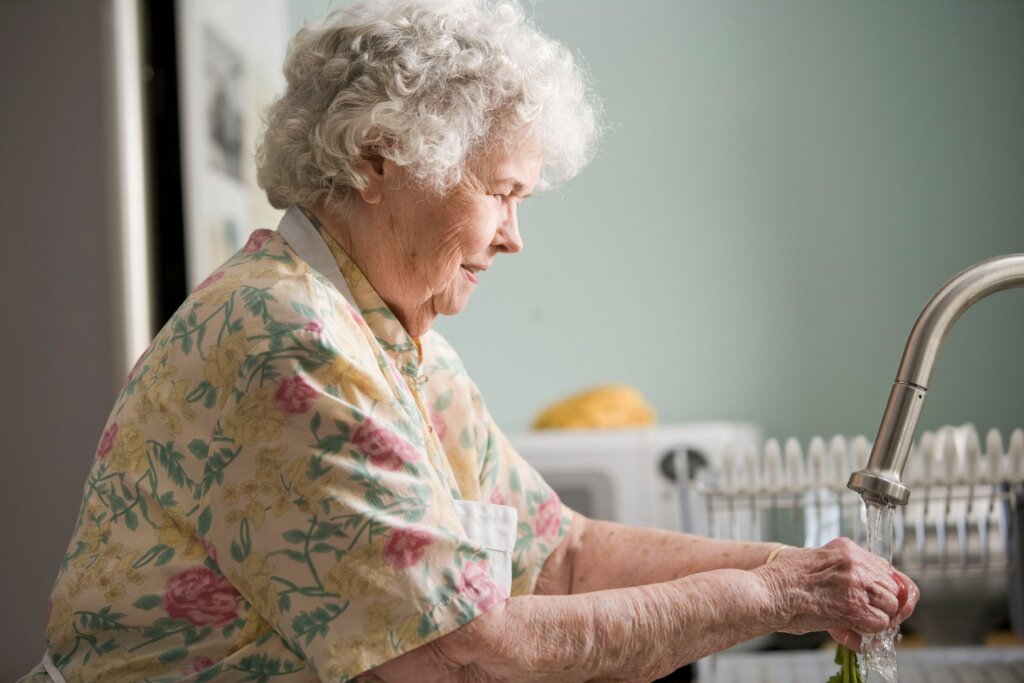
According to a study by the National Institute on Aging, most elderly adults want to live in their own homes for as long as possible. The study found that only about 25% of elderly adults said they would prefer to move into a nursing home or assisted living facility. This preference for remaining in one’s own home is not surprising; many older adults see their home as a source of independence and comfort. To remain in your home safely as you age, it helps to have a good support system in place both from family and friends and from professionals such as home health aides, while keeping up with maintenance.
Here are a few tips to help keep you in the comfort of your own home as you age.
Consider home modifications
It is important to keep your home well-maintained and safe. Install features that make it easier to live there, such as grab bars in the bathroom, stair rails and non-slip surfaces in the kitchen. Make sure to keep up with regular maintenance and repairs and have a plan in place for when you need help doing things that you used to do on your own.
What if you become reliant on a wheelchair? There are several home modifications that can make your home wheelchair accessible. You can install grab bars in the shower and bathroom, widen doorways, and add ramps or lifts to make it easier to get around. It is important to consult with a professional before making any changes to your home, as they will be able to recommend specific modifications that will best meet your needs.
If modifications aren’t feasible, you can also consider downsizing or moving to an assisted living community where you can maintain your independence with as much or as little support as you need.
Safety first
As people age, their risk of falling increases. Falls can cause serious injuries, including broken bones and head injuries. In fact, falls are the leading cause of injury and death among seniors. There are several things you can do to help prevent falls. One way to make your home safer is to remove trip hazards. Common trip hazards include extension cords, area rugs, and furniture with sharp edges. You should also keep walkways clear of clutter and ensure that all staircases have handrails. Wear shoes with good traction and keep a stable balance when walking. And be sure to exercise regularly to improve your strength and balance.
Managing your medications is also critical. It may help to have a family member or home health aide develop a system to help remind you when your medications need to be taken. Use a written schedule from your doctor or a weekly pill organizer to ensure you stay on track.
It’s also a good practice to get your vision checked regularly and wear your contacts or glasses. Regular monitoring of your eyesight, and making the necessary updates to your prescription, can also help reduce falls and medication errors.
Enlist personal care assistance
Many seniors need assistance with bathing, dressing, and grooming. This can be a challenge for family members who have full time jobs, travel frequently, have children to care for, or don’t live close enough to provide daily help. You may also feel self-conscious about having your adult children assist you with this type of care. Fortunately, there are many personal care services available to help seniors maintain their independence and dignity. Personal care aides can help seniors with basic tasks such as bathing, dressing, and grooming. They can also provide transportation to appointments and help with grocery shopping and other errands. Personal care aides can be hired privately or through a home health agency.
Another option is adult day care. Although the name is a little off-putting, adult day care centers can offer valuable support, providing social activities and personal care services for seniors who need some assistance but do not require full-time nursing home care. This can also be a great option for caregivers who need a break or for seniors who live alone and need or want some companionship during the day.
Eat well and stay hydrated
One of the most important things you can do as you age is to focus on your nutrition and hydration. Ensuring that you are getting the nutrients you need is essential to staying healthy and drinking plenty of fluids helps keep you hydrated. There are a few things to keep in mind when it comes to nutrition and hydration:
- Do your best to eat a balanced diet, with plenty of fruits, vegetables, and whole grains.
- Make sure you’re getting enough protein and calcium, both of which are essential for bone health.
- Drink plenty of fluids, especially water, to stay hydrated. Juices, milk, and soups can also help boost your fluid intake.
Stay socially active
It’s vital to stay socially engaged to maintain mental and emotional well-being. Social engagement can take many forms, from talking on the phone with friends and family, to participating in social activities or clubs. For some seniors, online communication through social media can also be a way to stay connected. Recent studies have shown that social engagement can help reduce the risk of dementia and other age-related illnesses. It’s also valuable for caregivers and loved ones to encourage seniors to stay connected with friends and family members and participate in social activities whenever possible.
What are my options if I can’t stay in my home?
Even if you do all the right things, it is important to acknowledge that you may not be able to stay in your home forever. There are multiple options if this becomes a reality. Downsizing to a smaller, one-level home is something to consider. Another option is an assisted living or retirement community that provides various levels of care and security. While it isn’t something people typically want to consider, a nursing home can be a lifesaver if you need constant specialized healthcare. They provide 24/7 skilled nursing care in addition to meals, social activities, transportation and more.
You may want to tour different facilities near your home or that are close to extended family if they don’t live in the same area as you. Talk to your loved ones about your wishes before a fall or other unexpected situation arises. Understanding the options that are available to you if staying in your own home is no longer feasible and playing a role in choosing where you will live will help ease the transition. To get you started, here’s a link to find and compare nursing homes, hospitals, and other providers near you provided by Medicare.gov.
Take steps to stay in your home and plan for the unexpected. It’s easy to put off planning to leave the comfort of your home, but you’ll be thankful you did if that time comes. Be sure to check out our senior resources page for additional information about a variety of healthy aging topics.
